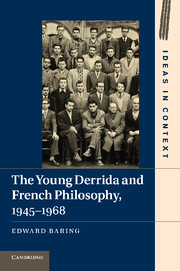Book contents
- Frontmatter
- Contents
- Acknowledgments
- A note on translations and reproductions
- Introduction
- Part I Derrida post-existentialist
- Chapter 1 Humanist pretensions
- Chapter 2 Derrida's “Christian” existentialism
- Chapter 3 Normalization
- Chapter 4 Genesis as a problem
- Chapter 5 The God of mathematics
- Part II Between phenomenology and structuralism
- Epilogue
- Bibliography
- Index
- References
Chapter 4 - Genesis as a problem
Derrida reading Husserl
from Part I - Derrida post-existentialist
Published online by Cambridge University Press: 05 November 2011
- Frontmatter
- Contents
- Acknowledgments
- A note on translations and reproductions
- Introduction
- Part I Derrida post-existentialist
- Chapter 1 Humanist pretensions
- Chapter 2 Derrida's “Christian” existentialism
- Chapter 3 Normalization
- Chapter 4 Genesis as a problem
- Chapter 5 The God of mathematics
- Part II Between phenomenology and structuralism
- Epilogue
- Bibliography
- Index
- References
Summary
Derrida's 1954 dissertation is often presented as proof of his mastery of Husserl. After the controversy caused by his most famous text on the German phenomenologist, Speech and Phenomena from 1967, the 1990 publication of his student thesis (his Mémoire), The Problem of Genesis in Husserl's Philosophy, seemed to demonstrate a much more conventional reading of Husserl, one that was more readily assimilated by the phenomenological community. Derrida's credentials in this earlier study were impeccable. He dealt with Husserl's entire oeuvre from his earliest publications to his last essays, both the translated and untranslated works. Derrida studied not only published books and articles but, with the support of Père Van Breda, had been allowed to visit and consult the Husserl archives at Louvain. The visit to the archives at Louvain was perhaps more significant for what it indicated about Derrida's interest in Husserl than for what he learnt there. His visit was short, about two weeks according to his wife, and his notes from the visit are relatively slim, playing only a small role in his analysis for the Mémoire. Rather than providing any actual material that he may have gleaned from the thousands of pages of Husserl's stenographed notes, the visit was significant in that it legitimized Derrida as a phenomenologist. Following the example of Maurice Merleau-Ponty, a visit to the Husserl archives at Louvain became an important qualification for up-coming students of Husserl's works. It showed Derrida to be a serious student of Husserl and not an existentialist hoping for a validation of his or her own theories.
The drive to completeness and the comprehensive scope of Derrida's Mémoire perhaps seems at odds with Derrida's later concern for the marginal over the totalizing, for the close reading of a paragraph over the all-encompassing theory of a life's work. We might then be tempted to draw a line between this early student work and the later “mature” philosophy. Such a move would, however, be overly hasty. Firstly, Derrida did not try to close off phenomenology, indeed the last paragraph of Derrida's dissertation cited Husserl on his deathbed, declaring to his sister that phenomenology must begin again. In his thesis, Derrida wanted to understand this constant necessity to restart. His guiding thesis was the impossibility of a rigorous and stable definition of phenomenology.
- Type
- Chapter
- Information
- The Young Derrida and French Philosophy, 1945–1968 , pp. 113 - 145Publisher: Cambridge University PressPrint publication year: 2011

